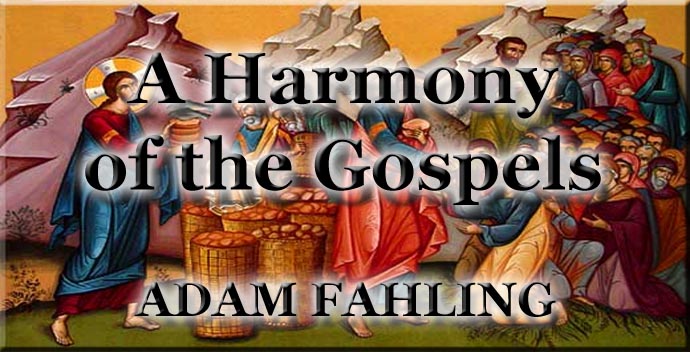|
[Mt 26:6-13]
d
6Now when Jesus was in Bethany, in the
house of Simon the leper, 7a woman came to him having an
alabaster jar of very expensive ointment, and she poured it on his head
as he sat at the table. 8But when his disciples saw this,
they were indignant, saying, “Why this waste? 9For this
ointment might have been sold for much, and given to the poor.”
10However, knowing this, Jesus said to
them, “Why do you trouble the woman? Because
she has done a good work for me. 11For
you always have the poor with you; but you don’t always have me.
12For in pouring this ointment on my
body, she did it to prepare me for burial. 13Most
certainly I tell you, wherever this Good News is preached in the whole
world, what this woman has done will also be spoken of as a memorial of
her.” |
[Mk 14:3-9]
d
3While he was at Bethany, in the house
of Simon the leper, as he sat at the table, a woman came having an
alabaster jar of ointment of pure nard—very costly. She broke the jar,
and poured it over his head. 4But there were some who were
indignant among themselves, saying, “Why has this ointment been wasted?
5For this might have been sold for more than three hundred
denarii,
and given to the poor.” They grumbled against her.
6But Jesus said,
“Leave her alone. Why do you trouble her? She
has done a good work for me. 7For
you always have the poor with you, and whenever you want to, you can do
them good; but you will not always have me. 8She
has done what she could. She has anointed my body beforehand for the
burying. 9Most certainly I
tell you, wherever this Good News may be preached throughout the whole
world, that which this woman has done will also be spoken of for a
memorial of her.”
14:5
300 denarii was about a years wages for an agricultural laborer. |
Jn 12:2-11
2So they made
him a supper there. Martha served, but Lazarus was one of those who sat
at the table with him. 3Mary, therefore, took a pound
of ointment of pure nard, very precious, and anointed the feet of Jesus,
and wiped his feet with her hair. The house was filled with the
fragrance of the ointment. 4Then Judas Iscariot, Simon’s son,
one of his disciples, who would betray him, said, 5“Why
wasn’t this ointment sold for three hundred denarii,
and given to the poor?” 6Now he said this, not because he
cared for the poor, but because he was a thief, and having the money
box, used to steal what was put into it. 7But Jesus said,
“Leave her alone. She has kept this for the day
of my burial. 8For you always
have the poor with you, but you don’t always have me.”
9A large crowd therefore of the Jews
learned that he was there, and they came, not for Jesus’ sake only, but
that they might see Lazarus also, whom he had raised from the dead.
10But the chief priests conspired to put Lazarus to death also,
11because on account of him many of the Jews went away and
believed in Jesus.
12:3
a Roman pound of 12 ounces, or about 340 grams
12:5
300 denarii was about a year’s wages for an agricultural laborer. |



 Home
Home What's New
What's New Bible
Bible Photos
Photos Hiking
Hiking E-Books
E-Books Genealogy
Genealogy Profile
Free Plug-ins You May Need
Profile
Free Plug-ins You May Need
 Get
Java
Get
Java.png) Get Flash
Get Flash Get
7-Zip
Get
7-Zip Get Acrobat Reader
Get Acrobat Reader Get
TheWORD
Get
TheWORD